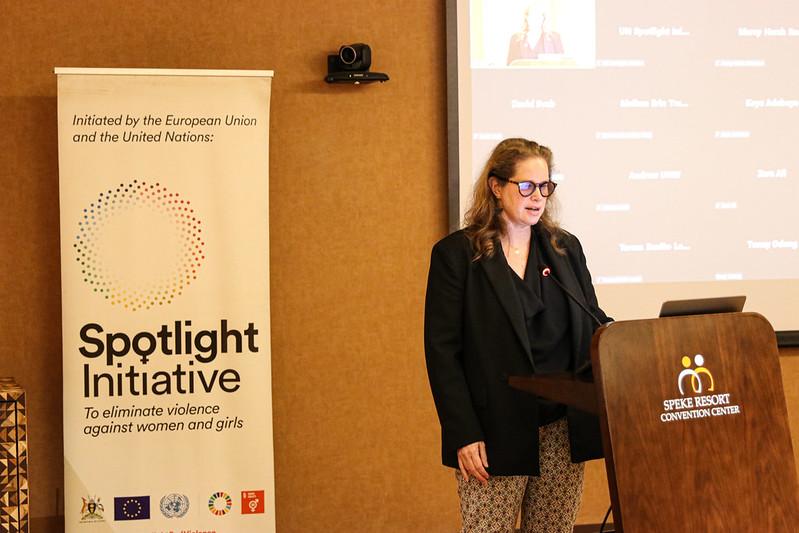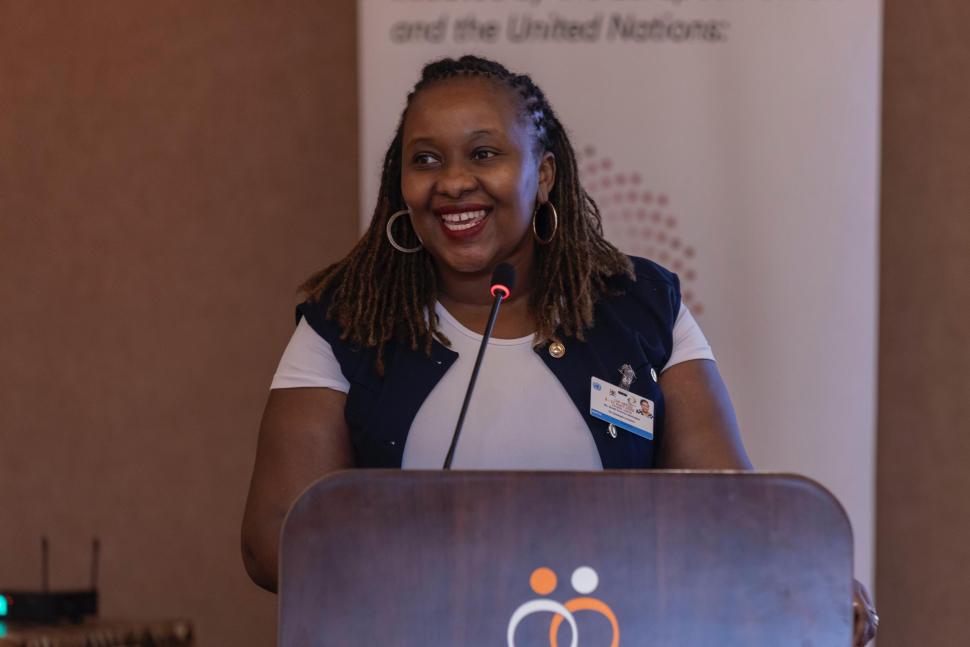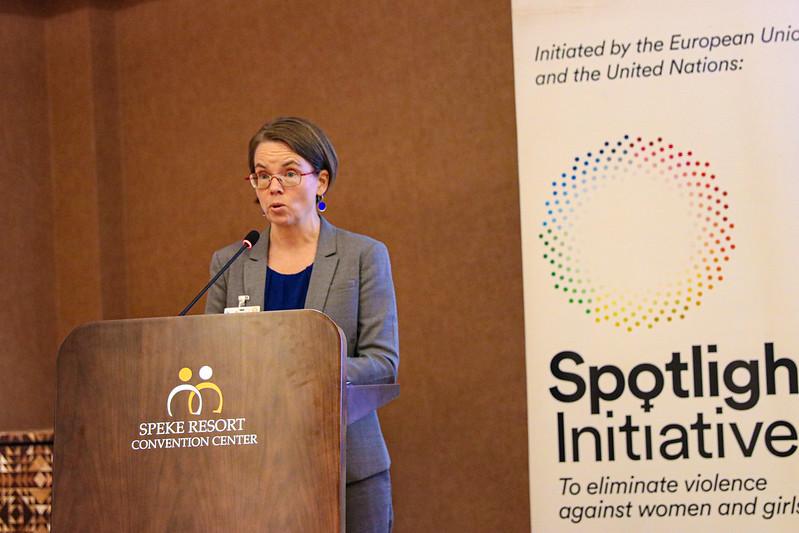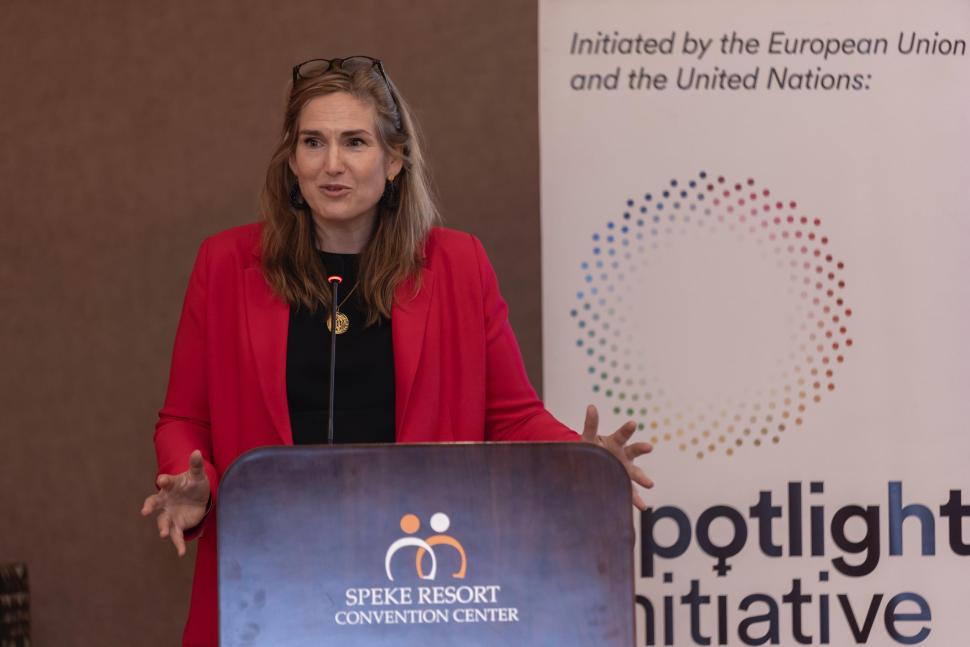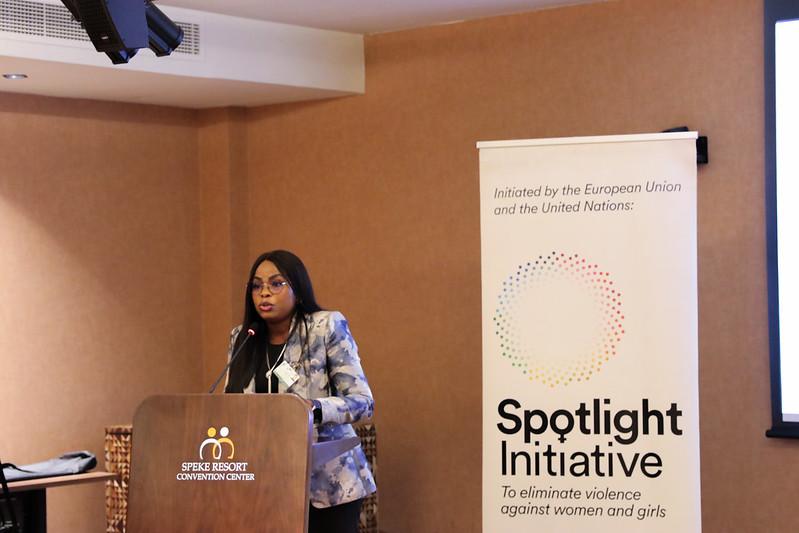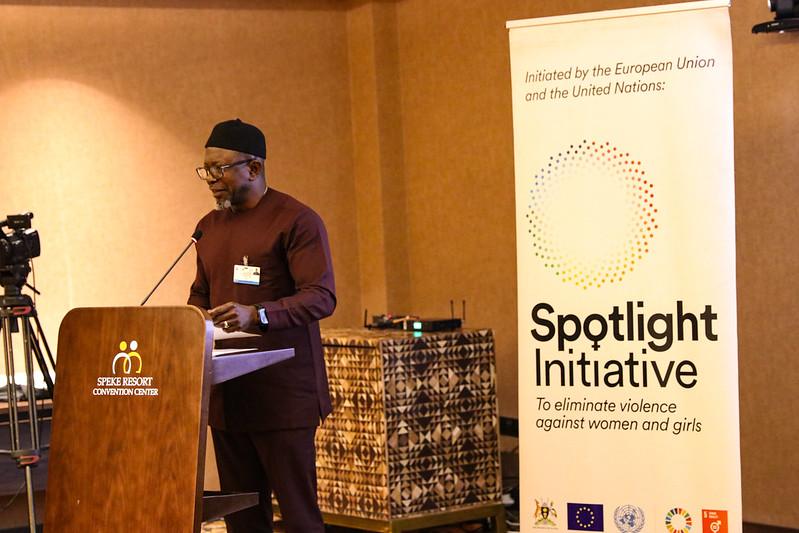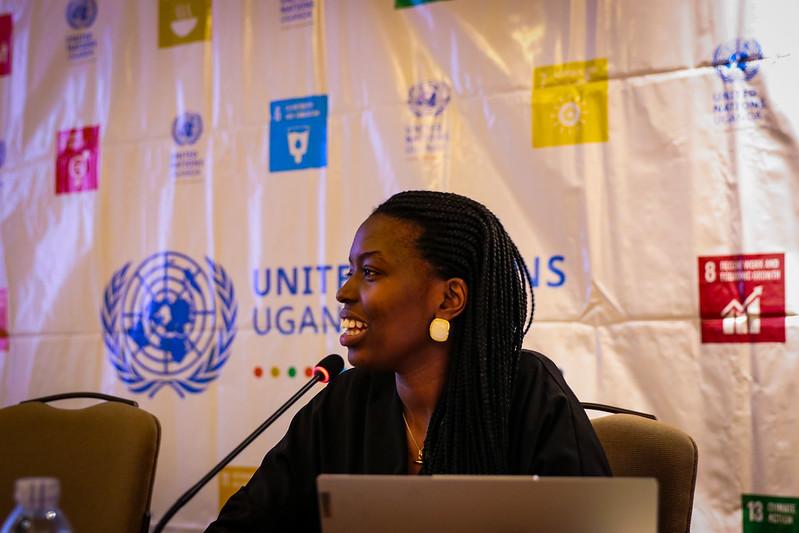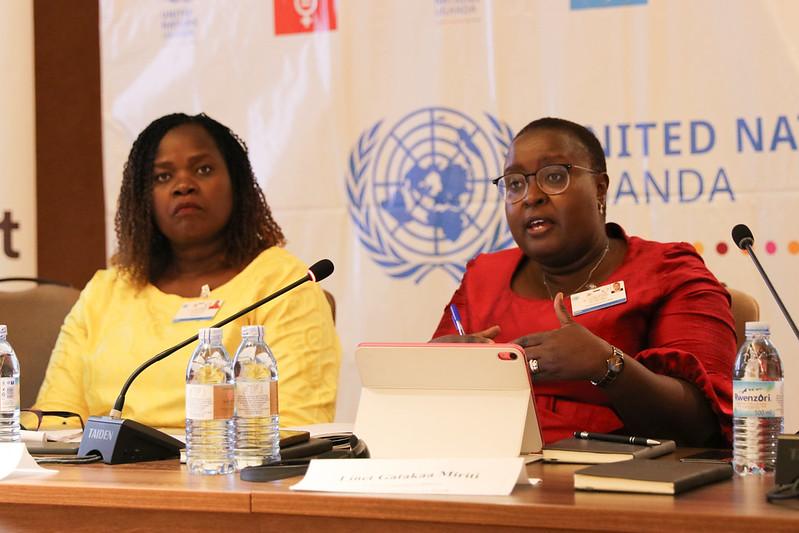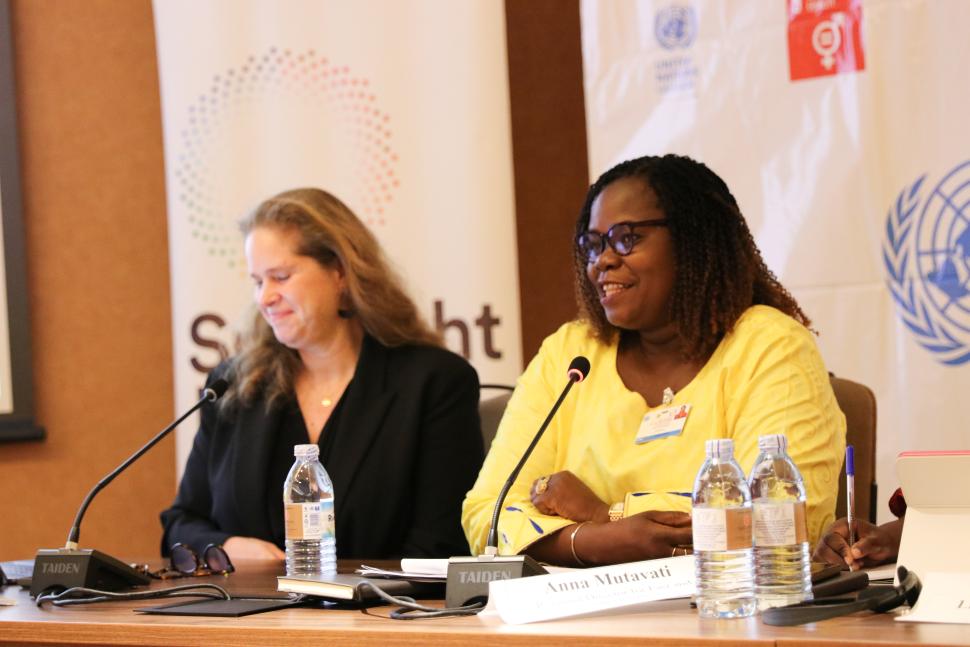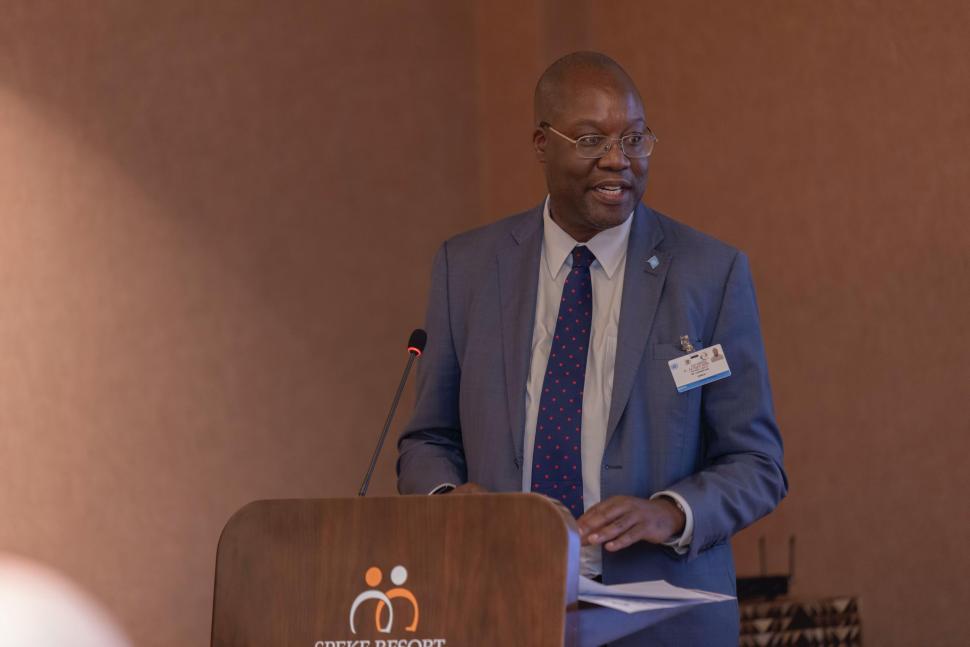Sustaining progress toward eliminating violence against women and girls through enhanced economic opportunity
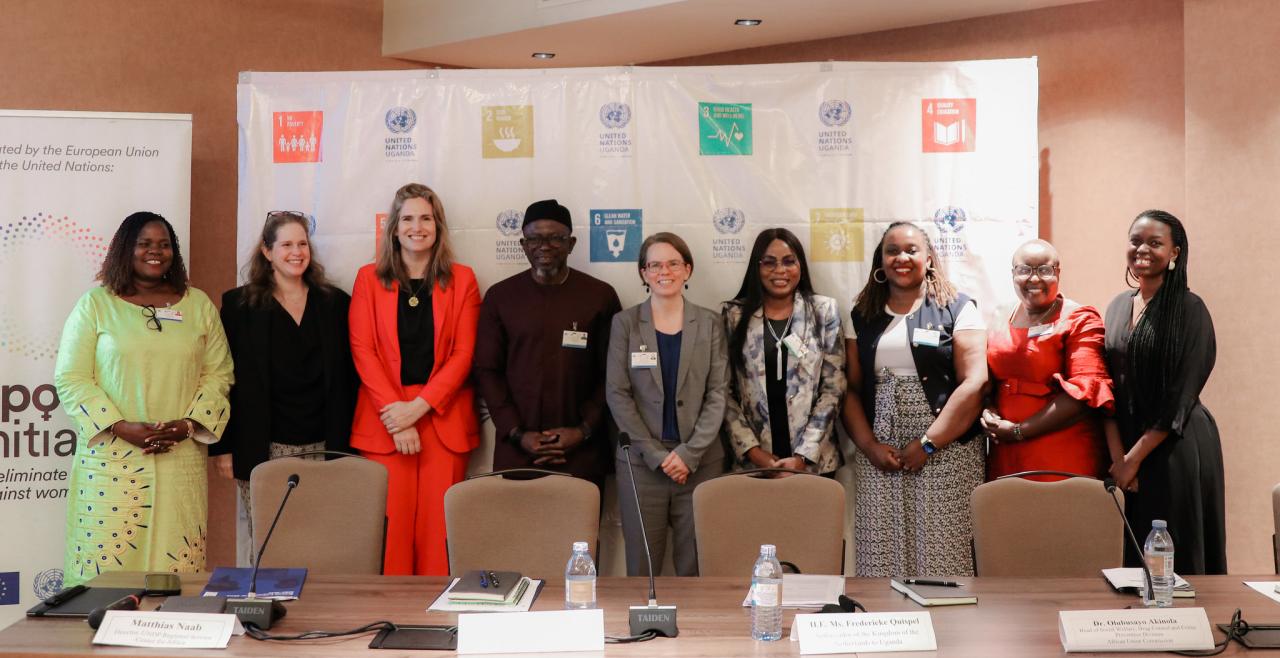
KAMPALA, Uganda - During the Eleventh Session of the Africa Regional Forum on Sustainable Development, leaders from governments, international organizations such as the United Nations and multilateral development banks, and civil society met to discuss pathways for ending gender-based violence (GBV) through the economic empowerment of women and girls. The high-level side event, ‘Sustaining progress toward eliminating violence against women and girls through enhanced economic opportunity’, took place at the Speke Resort Convention Centre in Kampala, with outcomes supporting the inclusion of regional and national perspectives at the 4th International Financing for Development Conference in Seville, Spain in June 2025. It was hosted by Spotlight Initiative, the African Development Bank (AfDB), the African Union Commission (AUC) and the Government of Uganda.
Spotlight Initiative’s Global Coordinator, Erin Kenny, welcomed guests and highlighted some of the Initiative’s most compelling results. “Since its launch over the past 7 years in more than 25 countries across 5 regions — with its largest investment, here, in Africa — Spotlight Initiative has employed a uniquely comprehensive, whole-of-society, whole-of-government approach that addresses all key drivers of violence against women and girls with transformational results,” she said. “More than 540 laws and policies targeting violence against women and girls were strengthened or passed. Over 50 countries institutionalized efforts to end violence against women and girls by strengthening national action plans. Nearly 6 million men and boys engaged in dialogue on positive masculinity and non-violent conflict resolution. And over 3 million women and girls accessed essential services including in fragile contexts.”
“In its second phase, the Initiative is expanding its universal reach, expanding and sustaining progress that has been made to end violence against women and girls to accelerate progress across the 2030 Agenda more broadly.”
Activist and member of Spotlight Initiative Global Civil Society Reference Group, Dorah Kiconco Musinguzi, said that backlash against women and girls’ rights and diminished financing meant that development funding would have to be done differently, stating, “Now more than ever, ladies and gentlemen, we need each other… The deep-rooted expertise of women and girls needs to be brought to the fore.”
“We know what works, that when women have an opportunity to earn they will leave abusive families,” Ms. Musinguzi continued. “They will get financial independence. They will be empowered when they get expanded job opportunities. We need to keep girls in school. We hope that the conversation we have this evening will hold us around those key pillars of ensuring that women get out of poverty but also that women get out of violence.”
Head of Cooperation of the European Union (EU) Delegation in Uganda, Karolina Hedström, said that the EU’s commitment to eliminating gender-based violence was evident in its foundational €500 million investment in Spotlight Initiative, as well as their ongoing support for the Initiative's second phase.
“From the European Union’s side, we are committed to working with all our partners to identify and support innovative solutions to sustain and accelerate these results that we have seen. But we need your support. … Through sharing best practices, being honest about what works well or not, and engaging new partners, and particularly ensuring that the voices of women’s organizations and civil society are central to all our actions, we hope that Spotlight Initiative can continue to drive catalytic change,” said Ms. Hedström.
Ambassador of the Kingdom of the Netherlands to Uganda, H.E. Frederieke Quispel, said that in Uganda, huge strides had been made in legal frameworks to address violence against women and girls, but that the need was large: “We have to keep in mind that 70 per cent of the criminal cases prosecuted by the Ugandan Director of Public Prosecutions are gender-based violence cases.” Ms. Quispel also emphasized the need to involve religious and cultural leaders in changing norms and behaviours at community level.
Head of Social Welfare, Drug Control and Crime Prevention at the African Union Commission, Dr. Olubusayo Akinola, said that ending violence against women and girls was essential to development and the achievement of the 2030 Agenda. “The African Union acknowledges the intrinsic link between the economic empowerment of women and the reduction of their vulnerability to violence. Therefore, integrating gender-responsive economic inclusion in our programming is not just an option but a necessity,” said Dr. Akinola.
Director of the UNDP Regional Service Centre for Africa, Dr. Matthias Naab, touched on the urgent need to strengthen domestic resource mobilization with a focus on scaling innovative finance mechanisms and aligning national budgets with gender equality goals. “Less than 1 per cent of national budgets are allocated to gender equality programmes,” he shared. “On a global scale, development assistance for gender equality averages 4 per cent. However, in Africa, this figure is significantly lower — only about 2.5 per cent. We need to do better.” At the same time, he recognized the great strides that have been made by the African Union in affirming commitment to eliminating gender-based violence.
He highlighted the necessity of "leveraging private sector partnerships to foster women’s economic participation and drive systemic change for gender equality and safety across all sectors" and "developing flexible financing models to promptly address emerging violence against women and girls crises while maintaining ongoing investment in conventional response.”
In the panel discussion that followed, Health and Wellbeing Programme Associate with the Women, Gender and Youth Directorate of the African Union Commission, Arlette Akingeneye, said that there was a need to bring together efforts from different groups working to end violence in their own mandates, including policymakers, development partners, civil society organizations, young people and other stakeholders. “There were a lot of efforts to end violence against women and girls but then we still saw that violence was a pertinent issue on our continent. We realized that there was a need for a comprehensive and coordinated response,” said Ms. Akingeneye. She also said that the recently adopted AU Convention on Ending Violence against Women and Girls was a groundbreaking example of mobilizing political efforts at the highest level.
Chief Gender Officer at the African Development Bank, Linet Miriti-Otieno, said it was very rare for governments to borrow for gender equality or ending violence against women and girls initiatives. “However, the African Development Bank does recognize that violence against women and girls is a critical barrier to inclusive growth… a barrier to poverty reduction and economic growth.” Ms. Miriti-Otieno said that the Bank had several gender-based violence prevention and response safeguards in place to prevent, mitigate and respond to gender-based violence.
“Given the trends that are happening on development financing for gender equality, we might actually be able to open up spaces to do more through the instruments that we have for financing,” said Ms. Miriti-Otieno.
UN Women Regional Director for East and Southern Africa, Anna Mutavati, shared some key lessons from implementing Spotlight Initiative, including that we “need to institutionalize women’s economic empowerment in our planning, in our budgeting, in our policies and in our programmes.” She also addressed the urgent need to address systemic barriers that keep women in poverty, such as access to financing and land, and said that economic empowerment needed to be integrated into survivor recovery.
The UN Resident Coordinator in Uganda, Leonard Zulu, delivered closing remarks. “In my home country of Zimbabwe, the word for ‘rape’ is the same as for ‘murder,’” said Mr. Zulu. “I am sure other countries have vestiges of similar values. It is a shame that today only 22 out of 54 African countries have laws on gender-based violence.”
“The Secretary-General rolled out Spotlight Initiative as a fund to demonstrate that the United Nations can deliver as one,” he continued. “The Initiative succeeded in proving that coordinated approaches can and do enhance efficiency in the delivery of benefits to those we serve.”

